#also the framing the animation every fucking scene is a painting it's gorgeous
Text
Blue Eye Samurai is a perfect intersection of Japanese culture, gender stuff, disability stuff, revenge quests, being Othered by society, and soulmates (derogatory) that is made for Jay personally
#fucking 10 out 10 recommend for pirate ppl too#there are some THEMES#blue eye samurai#thoughts#oh and it's been renewed for a second season#Mizu my best friend love of my life Mizu#also the framing the animation every fucking scene is a painting it's gorgeous#some of the coolest animation I have seen in a long time#I was RIVETED#AND THE MUSIC CHOICES#just a perfect show fr
21 notes
·
View notes
Text
GOD SPIDERVERSE IS SO FUCKING GOOD
#SPOILERS IN THE TAGS SO DONT FUCKING LOOK IF U DONT WANT THEM#EVERY FUCKING FRAME IS GORGEOUS#sorry ben riley fans to they did fuck up ur boy. he kinda deserved it (i. fucking hate the clone saga) but like not that bad lmao#like thats my main problem ben riley was underutilized and just kinda a gag#(his animation style is so fucking cool tho so its a shame)#IM FINE WITH THE SOLID TWO SCENES SPECTACULAR SPIDEY WAS IN THATS ALL I NEEDED FROM HIM#ALSO!!!!!!!!!! PENI!!!!!!!!!!!!!!!!!!!!! THEY FIXED HER FUCKING DESIGN!!!!!!!!!!!!!!11#SP//DR IS AN EVA NOW#THANK FUCKING *GOD*#also the prowler bit at the end was fucking awesome it was so cool#i was trying to figure out why the color pallet w/ that scene w/ rio was weird bc usuallty they're super purposeful with their color choices#and then i noticed. miles hoodie is purple. which is a color almost entirely reserved for prowler.#barely any other character has their main color as purple BUT prowler#so the moment rio didnt know who spiderman was i KNEW#GOD that was such a terrifying reveal#i genuinely FROZE when it looked like he punched miles that was one HELL of an impact frame like holy fucking shit#like actually felt my heart DROP#ALSO. THE FUCKING. THE END CREDITS SCENE.#IT WAS HAND PAINTED ROTOSCOPING I THINK. FOR THE ENTIRE SONG. AT I WHAT I *THINK* WAS 12 FPS.#LIKE I *TIRED* TO THINK OF A WAY IT COULD BE A FILTER BUT NO. NO THAT HAD TO BE DONE BY HAND.#HOLY FUCKING *SHIT* I WAS STUNNED LOOKING AT IT#HUGO;SEROAWOAWOE MY GOD I WOULD WATCH THE MOVIE JUST FOR THE VISUALS LONE#okay actual critiques is its like. SUPER quipy#like super super quippy up until the mid-to-end half#to the point where I was like. maybe. maybe tone down the snark a bit.#but it knew when to stop for dramatic scenes and it never undercut any of the actual heart so i think the latter half redemmed that for me#*redeemed fuck#also i was worried about the like. family and romance drama going on.#but it was well written imo! it didnt bother me too much!#miles and gwen are genuinely cute so i dont mind them bein togethr
6 notes
·
View notes
Text
Puss in Boots: The Last Wish and yes I'm late, so sue me
I wasn't going to watch any of the PiB movies but I heard 'Death' was a character, so
First two minutes:
It's GORGEOUS and here's an entire post of me freaking out over the visual mastery of this film

If I'd seen this in theatres today I'd get kicked out for gasping so much
I can't even

The animation style is so beautiful I'm gasping out loud and had to stop three minutes in to begin this post, it's wild. The particles - !
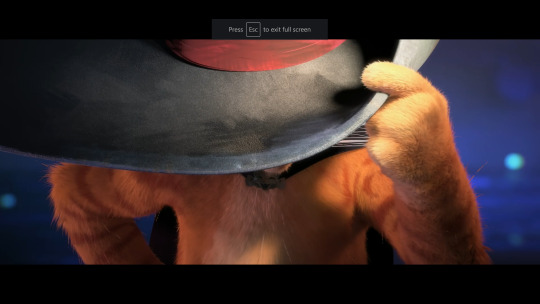
LOOK AT THE TEXTURE OF THE LEATHER HAT. THE ANIMATORS ARE FLEXING AND THEY ARE FLEXING HARD.
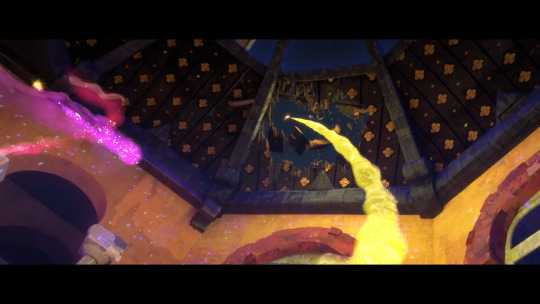
Every single frame of this film is a goddamn work of art. Look at the stars on the wooden ceiling. Look at the lighting.

Even the reflection in the glass, holy shit

They need to stop flexing before I have a frickin heart attack here
Also thank you for putting actual blood and not just a reddish cut, actual dripping blood, thank you :)
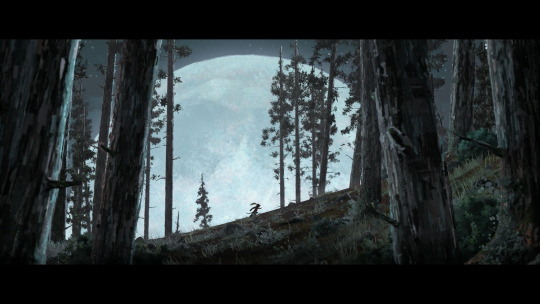
This is such a love letter to animation and art and I'm here for it

The scene transitions are absolute *chef's kiss*
THEY ACTUALLY *BEEPED* OUT A SWEAR WORD it's a third of the way through and this is my new favorite movie
Each glitter particle glistens in its own moment, I cannot
I feel like a lot of modern movies have some weird fear of putting genuine color into a film. WELL NOT HERE FOLKS. ABSOLUTE PSYCHODELIC COLOR EXPLOSIONS THROUGHOUT.
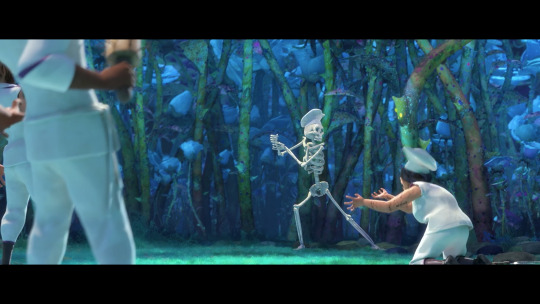
What the fuck, that escalated quickly
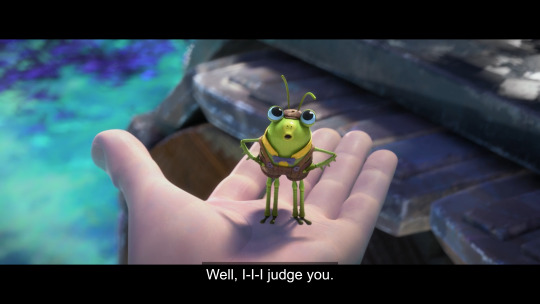
SIR WHAT ARE YOUR QUALIFICATIONS?
THe dog has a potty mouth and every swear word is BEEP'd out and he swore a LOT
I love how all of the characters just rant the fuck off in Spanish when they get mad
I didn't see the other Puss movies but Softpaws?? Was declawed at some point?? That's so mean?? that's literally amputations omg her poor hands
And she left Puss at the altar at the same time that HE left HER at the altar, these assholes deserve each other at this point because absolutely nobody else will put up with either of them on a serious level

except for the dog, who deserves the world. LOOK AT HIM
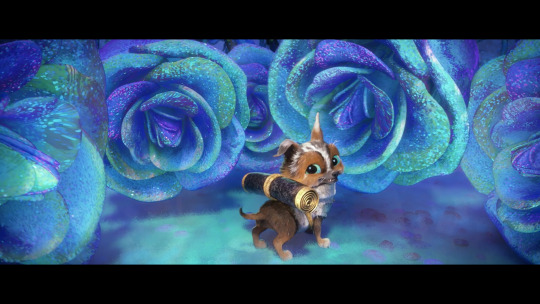
Kitty wasn't going to wait for a egocentric asshat to put down his ego for her, YOU GO GIRL
somebody put the puppy in a sock and tried to drown him omg
he has the saddest backstory but he's just happy to have his life and his friends, whereas Puss had nine lives and didn't appreciate any of them, okay, I get it now
The dog actually calmed Puss down from a panic attack and you could hear his heartbeat calming and it was really sweet
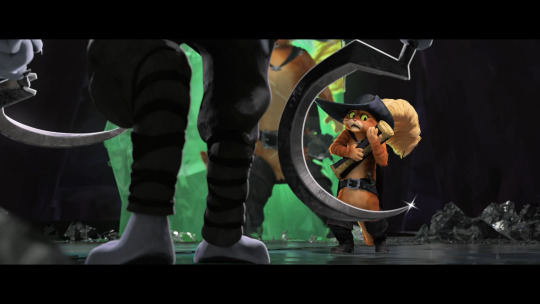
The framing of this film is fantastic. Also, Death? Actual Death? The thing that Puss wasn't aware he was afraid of or even needed to be afraid of yet was running from his entire life? Such an incredible villain
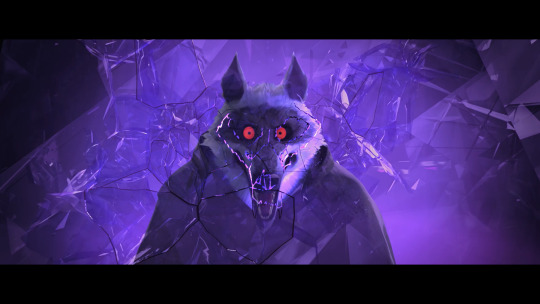
I can't concentrate on anything else about the movie because everything is just so goddamn pretty.
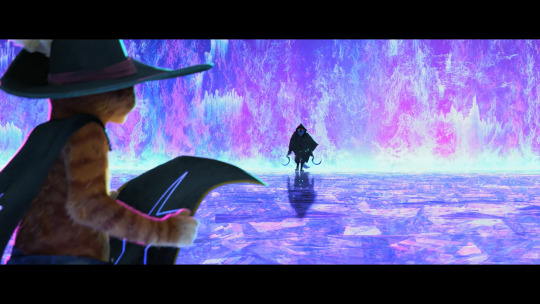
The movements and the visuals are just a little bit choppy and a little unfinished, making every still look like a painting. It's so stylized and wonderfully so

jesus christ what a visual callback
Okay movie's done and I can talk now
THE CAT LADY i love her <3
I appreciate that Goldilocks finally accepted her family but it's okay to want other things, I think, as long as you're not taking for granted what you currently have. That said, they're definitely going to have to talk it out because stuff like that doesn't just go away with a quip and a new business plan
One that note, the fucking cricket was hilarious. John Mulaney's character was a riot and I appreciate the cricket giving up on him as a bad job.
I was worried about Death's defeat being a bit of a cop-out but it wasn't. Death was angry that Puss was given so many lives and appreciated exactly none of them, thinking himself invincible forever, not understanding consequences because they never really applied to him, so they decided to cheat and take his last one early. But Puss accepted his mortality and began to appreciate his last life properly, so Death let him live it. It was done well.
I don't really like the 'tough girl no trust femme fatale love interest' thing, I think it's tired and overwrought, so Kitty wasn't my favorite, but I liked her anyway. And I liked that she's able to poor-little-meow-meow Puss when he least expects it.
The doctor scene where we went through each of Puss's lives was storyboarded so beautifully, even the title cards were gorgeous
the fight scenes are so pretty
I can't do anything besides gush over how fucking pretty this film was, I'm useless
Anyway watch the film, it's just a masterpiece and the music was fantastic and I loved the whole thing
11 notes
·
View notes
Text

So I guess it’s that time of day where I get up on my soap box to once again talk about the incongruities and gaping chasms in the Netflixvania plot that have yet to be addressed, specifically those that strengthen the case for why shoehorning Leon into this mess divorced of his supporting cast and story is probably a Bad Idea.
TL;DR I am perpetually tortured by the fact nothing makes sense right now so I am going to whinge exhaustively in a post to exorcise myself of misery and potentially spare my poor friend’s ears.
So. The show’s version of the origin story has not been properly detailed in any meaningful length except for the fact that a) Leon is indeed the patriarch of the Belmont family and b) he entered Wallachia specifically to hunt for Dracula. Sounds like the same story beats from LoI at face value, but just like everything else about this house of cards, it completely falls apart under the faintest bit of scrutiny. I’ve beat the dead horse of Mathias no longer being canon enough as it is, but Mathias is arguably the most pivotal character in the entire story. You cannot make a Castlevania adaptation that excludes his history and expect it to make actual sense. If you remove Mathias, you dismantle every facet of the plot in one fell swoop, especially if you’re going to try and wedge Leon Belmont into your story without him. The two are mutually exclusive, you cannot have one without the other unless you completely rewrite the canon to follow a wholly different trajectory that is free of those trappings (i.e Lords of Shadow, which I do not like, but I appreciate that it was trying to do something totally different and therefore don’t take great issue with it.)
And I would have accepted this level of reimagining was the show’s intention, if Leon wasn’t paid such a heaping dose of aggressive lip service to indisputably assert him as this universe’s Belmont patriarch as well. But put in context with the rest Ellis’ interpretation as is, this just ends up making no God damn sense.
Dracula has been explicitly stated to be the first vampire to exist in this universe. That solidly affirms that Mathias is not canon, so therefore Leon’s history with him is also non existent. So in turn, that logically means Walter Bernhard also never existed, Mathias never hatched that elaborate plot with him to betray Leon, Sara was never kidnapped, Leon never had to rescue her, she was never bitten by Walter, her soul was never sacrificed to make the Vampire Killer. So what did happen, then? If Dracula was never Mathias, then what the fuck was he up to in the 11th century? Getting his distance mirror apparently, which he made an oddly specific point of mentioning he acquired 400 years prior to the events of season two, which would have been approximately 1075. This would leave us 19 years prior to Lament of Innocence, so presumably Dracula was already a vampire when Leon was just a child. Which in itself just more effectively dispatches any expectations of their history together being the same or even just similar to what it was in LoI.
Albeit, Trevor treats us to some pretty loaded exposition in saying that the Belmont family hailed from France, moving to Wallachia when “the dark things all moved into the east”--followed by Alucard affirming that Leon was in Wallachia looking specifically for Dracula. So Dracula and his monsters were obviously in France at some point in this canon causing a stink that attracted Leon’s notice--we also have evidence of this with one of the storyboard artists drawing Leon in his knightly garb slaying said monsters. But if Dracula was never Mathias in Ellis’ interpretation, what was he even doing dicking around in France in the first place? And furthermore, what did he do to convince Leon to chase him into the east as well as devote his life and the life of every Belmont after him to killing Dracula specifically? Because it’s gonna be a pretty weak downgrade in motivation from the original story if he just wants to kill Dracula because Vampires Are Evil ™, or Dracula just offhandedly killed someone important to him without nary a drop of history behind them to give it weight.
Also another discrepancy between these two canons is Leon is still a knight when he goes into the east whereas he gave up his knighthood in the games; this is quite boldly showcased by his depiction in that big ass painting as well as the fact his sword is present in the Belmont hold--which is also coincidentally the thing that kills Dracula, not the Vampire Killer. And oh yeah, how the fuck is the Vampire Killer here if the whole plot behind its existence has been effectively erased? I repeat, it’s going to be a weak downgrade if it came from anything less than the tragedy of Sara Trantoul’s sacrifice--which its starting to seem like it will be, based on everything else that’s been exorcised from the show canon.
There’s just no sensible way to knit these two interpretations together at this point if Ellis is going to dig in his heels and maintain that Dracula’s history as Mathias is not part of his vision, so I really can’t say I’m sure what in God’s name he’s going to inject into the story to fill this gaping hole he’s gnawed into the canon. I strongly believe Leon should just have been quietly excluded if the most vital elements of his story have been erased along with Mathias as well. I would not be here complaining about this at all if Leon hadn’t been forced into this version of Castlevania unnecessarily, which then just opened up a black hole of inconsistencies. Why even add him? Why have your main cast keep talking about him? Why sprinkle in fresh lore about him? Why make his sword the thing that kills Dracula? Why do all this if he’s going to be either a non-entity in the future of the show, or you’re going to just ignore the entirety of the canon that he is inextricably attached to?
This is why I’m kind of in a purgatorial relationship with the show right now as we wait for season three; I have no idea if there’s going to be even a molecule of exposition showing off the “New and Improved” vision for Leon’s and Dracula’s backstory--a part of me finds their constant chatter about Leon a little too heavy-handed for his character and history to just be swept under the rug thereafter, but another part of me is pretty solidly convinced the show isn’t even going to attempt to address that elephant in the room from here.
However, if Alucard’s going to be left by his lonesome with nothing but his father’s castle and the Belmont library, then he better be busting his ass down there reading up on some Belmont family history. Because honestly? There really is no other purpose his character can serve when isolated from the rest of the cast, the action and the plot, besides acting as a vehicle for exposition. I’d like to believe that this was the intention behind that very sudden and very off-handed plot point of Trevor bestowing his family’s library upon him in season 2. Why else do that and then just leave him there? If Alucard is just going to be steered back into the fray early into the new season, then what was even the point of having the team go their separate ways?
Anyways. I’ve said before I really wouldn’t mind if the staff decided to rewrite Dracula and Leon’s history together a little due to the bizarre and convoluted nature of LoI’s plot which definitely needs a fresh coat of paint, and I still maintain that; but they seem to be both borrowing the outline of the premise while erasing the primary facets that made it work, and I’m entirely confused about how they’re going to actualise such a shaky narrative structure. Not very well, judging by this janky mess of plotholes they’ve dug for themselves--if they don’t just conveniently forget to ever address it again, I’m half sure their answers to these questions are going to be some wacky nonsense that probably even further diminishes the symbolic importance of the story as a whole.
If the show completely erases any meaningful relationship between Dracula and Leon as well as the gravity behind the Vampire Killer’s origins, then it will have truly sunk to a whole new depth. These are the only things I am begging Ellis not to fuck up. You know, the entire crux of Castlevania’s plot as we know it, and the entire reason this story is even playing out in this universe the way it is.
There’s no shortage of us already frustrated with his treatment of the canon as it is, and its a damn shame. I really like a lot of things about the show. The animation is still gorgeous, the music is wonderful, the atmosphere is great, and I felt genuinely moved by some of the scenes they curated for us. I appreciate the hard work the team as a whole has poured into it in the limited time frame they have to complete every season. There’s no taking away from the fact that the show has value in many areas. But Ellis to date has sadly cocked up more facets of the story than he has improved, which is what is consistently holding the show back. As much as I crave answers from this series though, I’m equally as afraid that I am not going to like them when I get them. Or that Leon’s character is going to get dragged backwards through a thorn-bush should he ever appear in the flesh.
I would love nothing more than season three to blow me away and restore my faith in the future of the series but at this point, I’d honestly settle for a few minutes of icon material and whatever answers there are so I can finally leave this bespoke Silent Hill Ellis’ writing has crafted for me, amen and good night.
#⚜ :: OOC┊Person of Sinterest#{sin complains; the thrilling novel you didnt know you needed}#{you dont need it LMAO BUT I HAVE TO SCREAM INTO THE VOID BC THIS IS DRIVING ME INSANE}#{u know that conspiracy theory meme from always sunny thats me}#{s3 or any consequent seasons will probably never answer my questions tbh ill just have to live here in this hell forever}#{also god damn please just release season 2's ost so i can enjoy that if nothing else}#{i hope s3 airs on my birthday so i can just really be kicked in the balls}
7 notes
·
View notes
Text
Watching Movies In Self-Isolation, Part Two
L’Assassin Habite Au Rue 21 (1942), dir. Henri-Georges Clouzot. Clouzot is better known for directing The Wages Of Fear (the movie William Friedkin remade as Sorcerer) and Diabolique, but this is the first movie he directed. It’s a pretty effective comedy, as well as an Agatha Christie style murder-mystery thriller. It’s really cool to watch these things that feel like they are just “movies,” before a bunch of genre conventions got built up and put in place. This one’s also eighty minutes long, super-short. The premise of the movie is there’s a serial killer on the loose, leaving a business card on every dead body. A dude passes along to the police that he found a stash of the business cards in the attic of a boarding house, so the killer must live there. A police officer goes undercover as a priest moving into the boarding house to investigate the residents. His wife, an aspiring singer, has made a bet with him she can solve the crime first, and in doing so become a celebrity that will be hired to perform places, so she also moves into the boarding house, partly to annoy him. The stuff at the boarding house is basically the film’s second act, while the first and third act are more typical murder-mystery stuff, although the tone of comedy is maintained throughout, despite all the cold-blooded murders.
All These Women (1964), dir. Ingmar Bergman. Kind of dumb sex comedy directed by Ingmar Bergman, but with gorgeous Sven Nykvist cinematography, bright jewel-toned pastels, and sort of theatrical staging in spots seeming to foreshadow Parajanov’s The Color Of Pomegranates or eighties Greenaway stuff. About a critic who visits the palatial estate of a famous cellist to write a biography of him only to find a harem of women; the whole thing unfolding from the cellist’s funeral a few days later. The winking humor is both music-hall bawdy but in a way that feels self-aware or “meta” in the context of a sixties film.
The Touch (1971), dir. Ingmar Bergman. Bergman’s one of my favorites, many of his canonized classics resonate deeply with me, but he was also astonishingly prolific, with a bunch of movies of his blurring together in my mind, and even more that I didn’t know existed, like this English-language one, starring Elliott Gould. Gould’s another favorite of mine, being in a bunch of great movies in the sixties and seventies, but damn, he’s unlikable here. Unlikable characters “hit different” in older material because I’m not sure if you’re supposed to sympathize with them according to the sexist cultural attitudes of the day. Here he’s “the other man” Liv Ullman is cheating on Max Von Sydow (RIP) with, but he’s pretty emotionally abusive, just a shit to her, extremely demanding of her in a relationship he did nothing to earn, though it does feel like the movie is kind of treating him as a romantic lead.
The Anderson Tapes (1971), dir. Sidney Lumet. This is heist movie, starring Sean Connery as a dude fresh out of prison, planning to rob his girlfriend’s apartment building, costarring Christopher Walken in his first film role. It contains all the plot beats of a typical heist thing, all the satisfying “getting the gang together, planning things out in advance, chaotic elements interfere” stuff but also a totally superfluous bit of framing about like constant surveillance, video monitoring and audio tape. All this dystopian police-state stuff seems, implicitly, like it would make a crime impossible to execute, the criminals are monitored every step of the way, by assorted agencies. But then the punchline, after everyone’s arrested for reasons having nothing to do with that, is that all this recording is illegal and all the tapes should be erased as the high-profile nature of the case makes it likely the monitoring agencies will get caught. Sidney Lumet directs a good thriller, even though I don’t find Connery (or Dyan Cannon, who plays the girlfriend) particularly compelling.
The Testament Of Dr. Mabuse (1933), dir. Fritz Lang. I watched this years ago, after reading Matt Fraction praise it, particularly how skillful the transitions between scenes were, and I really enjoyed it, but didn’t remember much about it and was excited to rewatch it. It’s got a lot going for it: An exceedingly elaborate criminal plot whose only goal is to wreak chaos, low-level criminals caught up in something they’re morally unprepared to reckon with, a charismatic police detective interviewing a bunch of weirdos, Fritz Lang following up M by continuing to be a master of film and sound editing very early stitching it all together. The Mabuse character was previously the star of a silent film I haven’t watched, and here he’s mute, which is a clever choice I didn’t register until writing it out just now. He’s gone completely insane, but is nonetheless writing a journal filled with elaborate crime plots, and his psychologist is completely insane and following these directions, in a commentary on the rise of Nazism in Germany at the time.
House By The River (1950), dir. Fritz Lang. I watched this in the pre-Quarantine days, but it totally rules. Again, it feels sordid in part because of how old it is and my assumption you’re meant to identify on some level with the completely loathsome protagonist’s sexual desire and anger at getting turned down. It’s so creepy, he’s listening to the sound of his maid showering at one point. All the characters seem very fun to play, they’re all pretty cartoonish. This guy murder his maid, and then gets the idea that he should write a book about the murder when someone explains the idea of “writing what you know” to him, and he is then surprised when his wife reads the book and puts together that it’s a murder confession, saying something like “Really? I thought I disguised it pretty well.” The film functions as a dark comedy because every character is completely mortifying. Lang’s work becoming less ambitious and more reduced in budget during his time working in America is pretty sad but this movie feels legit deranged.
Midsommar (2019), Ari Aster. Heard good things about Hereditary, but haven’t watched it yet, having been put off by the plot summary of Aster’s preceding short film, about a kid who rapes his dad. This is like a longer version of The Wicker Man, basically, starring Florence Pugh, who I had heard was like the new actress everyone’s enamored with, but didn’t think was that compelling in this. A bunch of Americans go to a Swedish village, one of them (played by Chidi from The Good Place) has studied their anthropology extensively, but all are unprepared for the fact that their whole culture seems to revolve around human sacrifice and having sex with outsiders so they don’t become totally inbred. There’s a monstrously deformed, cognitively impaired child who’s been bred specifically so his abstract splashings of paint can be interpreted as culture-defining profound lore, which I took away as being comparable to the role Joe Biden plays within the death cult of the DNC.
Long Day’s Journey Into Night (2019), dir. Bi Gan. This got a lot of acclaim, but I am almost certain the main reason I watched it is because the director made a list of his favorite movies and included Masaaki Yuasa’s anime series Kemonozume on it. Does a sort of bisected narrative thing, where half of the movie is this sort of fragmented crime thing, a little hard to follow, and then you get the title card, and then the second half is this pretty dreamlike atmospheric piece done in a single shot, with a moving camera. I’m not the sort to jerk off over long shots, although I appreciate the large amount of technical pre-planning that goes into pulling them off. The second part is pretty compelling though, enveloping, I guess it was in 3-D at certain theatrical screenings? I’m a little unclear on how my fucked-up eyes can deal with 3-D these days and I was never that into it. The first half is easy to turn off and walk away from, the second half isn’t but I’m unsure on how much it amounts to beyond its atmosphere.
Black Sun (1964), dir. Koreyoshi Kurahara. This one’s about a Japanese Jazz fan and dirtbag squatter who meets a black American soldier who’s gone crazy and AWOL. He loves him because he loves Jazz and all Black people, but the soldier is pretty crazy and can’t understand him anyway. Jazz is, or was, huge in Japan and this is a cooler depiction of that fandom than you get in Murakami novels but it’s a fairly uncomfortable watch, I guess because the black dude seems so crazy it feels a little racist to an American audience? Maybe he wasn’t being directed that well because there would be a language barrier but it’s weird.
Honestly the thing to watch from sixties Japan on The Criterion Channel is Black Lizard (1962), dir. Umetsugu Inoue, which I watched shortly after Trump’s election in 2016, when all the Criterion stuff was still on Hulu, and it cheered me up considerably in those dark days. It feels a little like The Abominable Dr. Phibes, but with a couple musical numbers, and is about a master detective who thinks crime is super-cool and wishes there was a criminal who would challenge his intellect. Then the Black Lizard kidnaps someone. It’s a lot of fun, with a tone that feels close to camp but is so knowing and smart it feels more genuinely strange and precise. One of those things you get fairly often where the Japanese outsider’s take on American genre stuff gets what it’s about more deeply and so feels like it’s operating on a higher level. I really love this movie.
I had this larger point I wanted to make about just feeling repulsed by genre stuff that self-consciously attempts to mimic its canonical influences and that might not be all the way present in this post. Still, something that really should be implicit when talking about movies from the past is that they are not superhero movies, and how repulsed I am by that particular genre’s domination of cinema right now, and how much of cinema has a history of something far looser and more freewheeling in its ideas of how to make work that appealed to a broad audience, and how much weird formal playfulness can be understood intuitively by an audience without being offputting, and the sort of spirit of formal interrogation connects the films I like to the comics I like (as well as the books I like, and the visual art I like), this sense of doing something that can only be done within that medium even as certain other aspects translate.
3 notes
·
View notes
Note
Thoughts on DreamWorks The Prince of Egypt (1998)?
WHERE TO I EVEN BEGIN I am very tired and kind of drunk and I can’t really convey the ammount of adoration I have for this movie.
But just know that during my like 3rd year of university my teacher asked us to watch and write a 6 page max essay about The Prince of Egypt-and I wrote like 26 pages plus 26 other pages of bibliography. My teacher was seriously annoyed but knew that for once I wasn’t acting out of spite and read all of it and I had a perfect mark on it.
All 26 pages of essay were basically just me gushing about how and why it was the best animated movie ever and I cried many times while writing it and watching the movie and listening to the soundtrack on repeat over and over again.
Until recently I saved the date every holy week, since it came out, to watch it when they broadcast it on national tv, and when I was a child I rented so often the vhs that my mom just ended up buying it for me, and I watched it so many times I broke it and was heartbroken when I had to throw it away only very recently because the roaches had eaten the tape
Just some EXTREMELY basic thoughts about it.
Ofra Haza sang the River Lullaby in 18 of the 21 languages the movie was translated to. I have watched the movie in french, english and spanish. Hans Zimmer never wrote another soundtrack that could hold a candle to the Prince of Egypt’s. Ofra sang to a doll during the recorders to make sure her acting was as flawless as her singing and it paid off. Try to listen to Deliver Us without feeling like your heart is both exploding from joy and breaking at the same time.
I was raised catholic so it was one of the few movies my catholic conservative grandfather allowed me to watch without complaing and I only recently realized I was 300% thirsting for Tzipporah holy shit. By recenlty I mean THAT WAS PART OF MY ESSAY.
The artists and animators put more effort and love into each frame of The Prince of Egypt than my parents put into my conception. They were taken to Egypt to study ancient art, they travelled to Death Valley to learn to paint the desert, they were trailblazers in the incorporation of 3D/CGI in bidimensional traditional animation. I have wanted the art book since I can remember. Thinking abt the ammount of love and effort that went just into the color keys makes me want to keep going. One day, I want to love something I make that much.
The art inspired one of my favorite artists ever, @silvestervitale‘s and every time I think about it my heart swells with joy.
And yet, the movie preferred to avoid marketing and making toys because it wanted so badly to get its message across. Just for that I respect it more than I will ever respect any disney movie which isn’t a high bar tbh but disney themselves crawl under it every time
Despite being a biblical story, you don’t need to be religious to adore this movie, because it’s so human and genuine and authentic and the message of faith and hope and of never bowing down and of finding who you truly are and who you belong with even if it means defying the expectations of your surroundings is universal.
And also it’s legit some of the most gorgeous animation ever made, if not THE most beautiful piece of animation ever made, and if you have eyes you WILL enjoy this fucking movie
Just so you have an idea of how much I love this movie? I was abt to go to bed but now I’m hugging my empty can of beer trying to hold back tears from just thinking about the opening scene of this fucking movie because it means that much to me.
If you put a stetoscope to my chest you’d hear Ofra Haza singing Deliver Us
76 notes
·
View notes
Text
Thoughts on Voltron Season 7
SPOILERS, OBVIOUSLY!
Things that annoyed/angered/saddened/frustrated me:
*Kuron still being treated as though he was nothing more than some evil monster and convenient spare parts for Shiro. I am still nauseated by the whole thing. This poor precious baby boy deserved so much better.
*Shiro’s hair -I mean come on, his fringe was pure white before but now it’s grey? What, did the whole process leach colour from the rest of his hair yet restore some to his fringe?! I will just assume it’s meant to be white but they felt this particular shade of white/grey worked best aesthetically with his outfits etc.
*Too little Shiro for too many episodes.
*Too much Keef.
(Sorry, fandom has completely ruined this character for me, he’s not a bad character but I am repulsed by his mere name thanks to the toxicity in this fandom. I wish I could go back to the beginning of watching Voltron when he was just another decent character that I felt neither yay nor nay about, but it is what it is.)
*That weird game show -if it was some magical space mage mumbo jumbo thingy that just transported their consciousness, why wasn’t Shiro there? And the whole ‘comedy family’ shtick with the Galra... I mean, it was a bit funny but... mostly weird tbh. The funniest parts were the commercials.
*Way too little background/interaction with Shiro and Adam.
*Also Adam’s design -like, why do you make an entirely new character that looks a lot like a mix of two other characters who are father and son (Matt and Sam)? You could have done literally anything to his design but you went safe and way too familiar? I mean holy moly did you see Kinkade? Fuck yeah what a gorgeous design, that is exactly what my hopeful heart pictured for Shiro’s boyfriend but nope. Give us generic floppy-hair glasses boy with a generic medium brown palette, it’s so fresh and new and interesting. Not.
*Adam FUCKING DYING before Shiro even got back to Earth. You could have at least let the poor boy have a reunion with someone waiting for him on Earth before burying some more gays, but no. He must suffer.
*Shiro getting like three seconds to mourn Adam.
*Speaking of burying your gays... (not to mention a delightful dash of the ‘evil lesbians’ trope): Ezor and Zethrid. Yayy on their relationship, nay on them being presumably killed off (I mean killing 3 out of 4 queer characters while keeping the straight characters safe is not a good way to show how queer friendly your show is. And no the ‘we had to show how dark and dangerous war is’ excuse doesn’t work when the only characters you kill are the queer ones. There were plenty of characters back on Earth we’d have felt just as deeply about -or more even- considering we’ve heard about the other paladins’ families back on Earth but we’d never heard of Adam until now. Just imagine if Veronica had died -that would have been intensely emotional and really had gone to show all that you wanted about the dangers of war -especially as I don’t doubt for a second that Lance would have gotten an entire episode at least to mourn her while Shiro got like three seconds. Because Shiro is apparently not allowed to mourn).
*And isn’t it funny how the most alien-looking Galra women are the evil ones, while the ‘good’ ones look more or less like lavender-skinned human women (and are also very pretty, petite and with slender, ‘sexy’ bodies.) Like, seriously...
*Not to mention how creepy it is that Keef’s Galra mom and the other ‘good’ Galra woman (Acxa, who for whatever reason the show tried to force some out-of-the-blue yucky heteromance together with Keef) look disturbingly much alike (and they look to be the same age too more or less. So sick and tired of the ‘hot young-looking mom’ trope in media but especially animated shows. And especially when the kids end up banging girls looking to be more or less the same age as their mom).
*Shiro not reacting when Ezor and Zethrid went for Pidge -he’s consistently been shown to be very protective and self-sacrificing, yet here he barely bats an eye. I get it was a scene framed to lift Lance, but it felt extremely ooc for Shiro to not at least try to help.
*Ezor and Zethrid’s relationship being honestly way more explicitly stated than Shiro and Adam’s (which was the relationship hailed as the big lgbtq+ rep for this season). No, they definitely didn’t need to get back together for Shiro to still be considered lgbtq+ rep -you don’t need a partner to be lgbtq+!
But when you wave a specific relationship around as a big banner of glorious lgbtq+ rep to come and then barely even hint at it in the show... well... not so much of a rep then, is it?
*Not showing Shiro in that worldwide message of ‘these are our beloved brave heroes from Earth’. Like, this boy was kidnapped by aliens, spent a year being tortured, brainwashed, cloned, dismembered, pretty much violated in every concievable way, then immediately after escaping (with a shitload of PTSD in the baggage) he was sent back out into space and chosen to lead some war against seemingly impossible odds, a war that really wasn’t his war to fight, a war he still fought bravely and selflessly despite his physical and mental issues, a war he died in, but meh I guess he wasn’t worthy of mention.
(And I don’t know why Keef wasn’t mentioned either, but maybe being half Galra makes you too much alien to be considered part of the world you were born and grew up in *heavy sarcasm*).
*Shiro’s bond with the Black Lion and his role as the Black Paladin being pretty much erased/retconned -it’s like Keef gets to sit his ass comfortably down in the seat Shiro shed blood sweat and tears for and struggled so hard for, easily just gliding along on what Shiro has paved the road for but without acknowledging the huge role Shiro had in it all. Shiro was the one who brought out the wings for Keef in the end of the last season because Keef was unable to do it himself, because Keef had never bonded with her the way Shiro did -Shiro and the Black Lion found and saved each other in so many ways, and the Black Lion loved Shiro so much she saved his ‘essence’ inside herself, yet now we’re supposed to just accept that Shiro is old news and no longer worthy of being considered part of the ‘mighty Paladins of Voltron’.
Myeah, did not like the feeling I got of this saturating this entire season. Keef can still be a big hero -or even your new main character- without grinding Shiro down into the dirt on the way.
*That arm... it’s so big and clumsy-looking it makes him look weirdly lopsided. The comically large arm works for Sendak, considering his ‘evil sadist who loves crushing people with his alien prosthetic’ shtick, but for Shiro it just looks too big to be practical. If it was intentionally meant to imply that Allura just grabbed a prosthetic modelled after someone bigger than Shiro and remade it, and that’s why it’s so big on Shiro, that’s fine. But it feels impractical for anything other than fighting evil alien generals.
*Shiro not getting to fulfil his arc as the abused victim and underdog by overcoming and defeating the evils pushing him down, but instead being forced to take the backset to a character forced into a leadership role for what seems like nothing more than a desperate clinging to nostalgia. It is mindboggling that everything Shiro has worked so incredibly hard for, everything he’s struggled and fought for is being taken from him and he’s supposed to be satisfied with a consolation prize. Yeah, Shiro going full Magical Girl Princess was amazing but he didn’t even get to deliver the final blow in any fight -not even his personal fight with Sendak- because apparently Shiro is not allowed any victories at all.
*The whole sense of Shiro being punished for choosing his life’s dream over becoming the obedient house wife of his ex -he had only a short few years left to fulfil his dreams, and yet he’s painted as the bad guy for ‘abandoning’ his boyfriend (who was the one that left Shiro, actually).
Yes, Adam had the right to choose to not want to separate for so long -during what was likely the last few years Shiro had enough mobility to do all the fun things couples dream of doing together- he had the right to say ‘I’m sorry but I can’t put my life on hold, and I wasn’t really prepared to go straight to caring for someone with a debilitating disease without a few more years of fun in between, I want to break up’. That still doesn’t make Shiro’s choice to follow his dreams any less valid than Adam’s choice to not wait for him.
I bet Adam had an exciting bucket list waiting to start ticking off as a consolation when Shiro was denied the role of pilot for the Kerberos mission -I doubt he’d expected Shiro to actually be allowed to go and that probably seriously stumped him- but it’s incredibly cruel and selfish (and ableist) to expect a person to sacrifice their last few years of being able to fulfil their dreams just so their able-bodied partner can fulfil their small dreams and wishes of things they want to do for the last few of that person’s fully mobile years.
And yet everything about Shiro’s arc paints a very very grim and ableist story of ‘you chose your own dreams over bending to your partner’s will, now let us show you what a horrible decision that was by torturing you relentlessly throughout the rest of this series without ever letting up. You will never be allowed happiness again because this is your punishment.’
I agree with other people that the way Shiro’s been treated throughout this series -constantly tormented without ever getting a single break or getting a real chance to fight and overcome his demons- seems way too much like torture porn.
*The feeling that Shiro’s Magical Girl Moment was only there to blind us to the fact that him being probably the only one able to transform the Atlas means he’ll be conveniently grounded next season, forced to stay on Earth to ‘protect his home’ while the rest of them get to go off being the ‘amazing Defenders of the Universe’, leaving both Shiro and his legacy behind, unsung.
I hope I’m wrong, but I get an overwhelming feeling that Shiro is being pushed into the background because they never intended for him to be the hero of the series but by the time they realised that’s exactly what they’d created with him it was too late to take it back, so now they’re trying their hardest to push him back into some mentor/backseat role in a sneaky enough way that they hope people won’t notice because they’ll be dazzled by the shine of his ‘new role’.
...
Things that made me happy/excited/pleased:
*The animation level. I mean holy mamacita Shiro is so beautiful he glows in like every single frame.
*HUNK. Love this big gentle boy and love that he got to show more of who he is and what he has to give this season.
*Seeing the families we’ve heard so much of. Seeing them reunited. Seeing flashbacks to happier times with the families.
*Pidge finally getting her entire family back together.
*The designs of all the alien/Earth tech. Gorgeous.
*The design of some of the new characters <3
*So many new Galra characters with faces and personalities even if we only saw them for a few seconds.
*All the ‘Earth preparing for alien invasion’ scenes/episodes.
*Finally getting to know more about Iverson and who he is as a person.
*Sam and Colleen.
*Shiro being the new Princess of the new Castle ship.
*Shiro fucking transcending being the Princess and transforming the entire Castle ship Atlas into a new Voltron type battle robot.
*The Atlas being this beefy paladin type knight on top but t h i c c femme legs on tippy toes/high heels on the bottom. 10/10 what a beauty.
*White Lion Shiro... I mean, I’m certainly not the only one thinking it, right?
*Just Shiro. Wow. What a strong, beautiful, good person who cares about everybody else above himself. Someone give this poor traumatised boy hero a fucking vacation with the softest bed surrounded by therapy animals. Perfect cinnamonroll too pure for this world.
*Shiro fighting Sendak hand-to-hand on top of a fucking space ship free-falling (read: CRASHING) to Earth instead of trying to escape I mean this boy
*Keef fucking anime-slicing Sendak in twaine for daring to try to hurt the person he loves like a brother (bloodless and nice for the young’uns of course, but still).
*Hunk carrying Shiro.
*@ anyone claiming Lance ‘never gets screentime or development’ -fuck you. Look at this brave, strong boy who started out as a self-centered antagonistic jerk yet has grown into such a good and mature person. I may loathe the Lance I see portrayed in the fandom, but in the show he’s still such a good character.
*Coran, Coran, the gorgeous man <3
*The mice and Kosmo the space wolf for MVP
*Kaltenecker, most chill character in the entire universe.
*Shiro’s prosthetic not being attached -at first I was like ‘noooo’, but then I realised... fuck yeah this is exactly what people in fandom need to stop erasing disabled characters. It is way too common for people in fandoms to claim that a person having any kind of high-tech or magical prosthetic that makes their disability less visible (For example Edward Elric from Fullmetal Alchemist) isn’t actually disabled at all ‘because it’s like they have normal limbs’. Having a prosthetic arm that has a big void between itself and the shoulder attachment makes it impossible to ignore the fact that Shiro is missing a whole arm.
(And maybe, just maybe, people will finally stop with the shitty ‘he’s got a full sleeve of tattoos instead of a missing arm in this AU fanfic because erasing disabilities is super cool’ trope.)
*The entire Shiro/Atlas transformation scene -ugh so beautiful <3
...
Phew, that got long! (=A=;;)
I’ve probably forgotten a lot of things -but it’s been a few days since I watched it so it isn’t as fresh in my mind as I’d have liked, however I don’t have the time to rewatch it right now to refresh my memory so it’ll have to do.
These are just my personal thoughts -things I found negative might be things someone else found positive, and things I found positive might be things someone else found negative. This isn’t meant to be a debate or attack -just a way for me to put my thoughts down and remember them for the future.
And one last thing -please remember to be kind to each other -and don’t go attacking cast or crew -most of them have no real say in what happens on the show anyway, and harrassing and threatening castmembers to the point where they’re scared to even show up at cons is not the way to make the higher-ups listen to your complaints -however legitimate they might be.
Now I guess we’ll just have to brace ourselves for season 8...
#voltron spoilers#both negative and positive thoughts on this season#voltron season 7#takashi shirogane
1 note
·
View note
Text
Views on Episode 1 of Golden Kamuy
Alright might as well talk about it cause good lord am I disappointed but not surprised.
As with all things, let’s talk about the good.
The adaption, for the most part, is very faithful. They didn’t add anything and they didn’t take away too much. I for one, like manga-faithful adaptions.
Asirpa is very well modeled and I’d say prettier than in the manga. She remains on model for the most part as well, though that one is a debatable positive.
The soundtrack, from what I can hear, is fantastic. It has the folkish feel and not at all modern-sounding. It sounds like they use wooden instruments in the orchestration, but that could just be a synthesizer’s fanciness. But nonetheless, it’s gonna be a fantastic OST if this is any indicator.
The inclusion of other characters and other character traits (such as the eyes, for those that are caught up and everyone’s favorite old coot) of later characters is a nice touch. Doesn’t make things seem as surprising when they do show up due to connections and makes manga readers go “Oooh”. A nice touch.
Backgrounds are still gorgeous and look like Bob Ross did them. Quality, given how pretty the manga was.
Hoo boy, now the bad.
Let’s get the elephant out of the room.The fucking bear(s). Oh good lord. I might be a bit bias because I just got out of the second to past season with Houseki no Kuni’s CGI but it’s terrible. When I mean terrible, it’s not terrible in the mechanical sense. If those things were in a game like Rust or something, they’d be very impressive with the detail work and realistic movements. However, this is an anime where you have painted backgrounds and 2D characters. Realism is going to stick out like a sore thumb no matter what and make the show look janky and terrible (not to mention the model don’t mesh with the background because at one point it’s paw was floating on top of the ground). It also ruins immersion, which is critical to any sort of entertainment media. If you’re laughing at what is supposed to be a significant threat (especially given the role bears play in later parts of the manga and how they rip off people’s faces), it ruins the whole experience. Hyperrealism is not doing the show any favors. Hyperrealism in any anime is a bad idea unless you’re trying to go for a comedy or gross factor like Flapjack or Popteamepic or something.
In the vein of bad CGI, the fire and Repun. Now the fire could have been a stylistic choice to make the bear not stick out as much, but every time it came up the eye is just going to be naturally drawn to it. As all things that obviously do not fit in the genre it’s in. Adding to this is Repun. At first, Repun was pretty okay until he started to fight the bear. The obvious CGI was obvious and many parts it was clear Repun’s jaw wasn’t connected to the bear’s arm. Personally, I’d take Repun’s pretty decent CGI for the bears rather than whatever the hell they took instead. It might have looked funny, but it meshed far better with the character design and overall feel of the show than the bears did. No idea why they didn’t have a similar style for the bears, I assume there wasn’t a model available.
Animation. Now, again, I have bias because Trigger/Gainax has spoiled me but I can still tell janky things when I see them. You know the studio is either on a budget or rushing or both when you have still images with a few layered moving parts. Nobody moving while someone is talking is pretty bad when the only instance of animation is the mouth. Especially when I can individually pick out each frame that is unique to make that animation possible. I’m used to doing that in the big influx of 2000s era Golden-age anime, not many in the 2010s. Of course, there are other anime I can do this with but again, those are the SAO clones that are obvious cash grabs. Now this animation problem wouldn’t be an issue if it wasn’t nearly every scene that had it. If there was no action, it was these few frame talking instances. Sugimoto and Asirpa and the drunk criminal were very animated in close ups, but otherwise, not so much.
Adding to the animation side, the Asirpa floating hand when she reached for Repun and her being Exit-Stage-Left cane’d by the bear weren’t good.
This next point is very personal but the gore. Golden Kamuy stuck out to me back in the day because of its gore. People got beheaded, shot, gouged, stabbed, you name it. Kamuy handles it in a very unique way too, pretty much a hit and run style of shock. Not to mention the realism given the author’s attention to detail. So I was excited to see the realistic gore since it’s so rare in anime nowadays. Instead, I get...Kool-Aid blood and a surprising lack of organs. Nothing drives me battier in edgy anime than the Kool-Aid blood like oh my god. It not only breaks immersion but it’s ugly and sticks out. Like it’s obviously fake. Golden Kamuy shows the harshness of living in a unforgiving landscape like Hokkaido, shadowing things out or Kool-Aid blooding things only dampens that effect. Of course, this could change in the Blu-Ray but I doubt it’d fix everything.
In conclusion:
I’m still going to watch it.
1 note
·
View note
Text
My upbringing was starkly black and white, everything strictly categorised as sin and acceptable, allowed and not. The massive ‘sin: not allowed’ category swallowed everything in legalism and immutable consequences. I fell in love with noir partly because it has no such hangups.
I savoured noir’s evocative language and sexual undercurrent. I learned to believe exposing repressive authority and dirty deeds was valiant even if ultimately futile, and justice could be delivered even when corrupt systems stymied it. The hardboiled detective attracted me from every angle, and I dreamed of both being and fucking the daring mystery-solving, smoking, drinking, dame-bedding wiseass. The detective archetype is dangerously appealing; stalwart antiheroes holding to their personal code while all around them people sold their souls for a bottle of scotch, a land deed, a tempting woman or a hard man. Terribly tragic, and as such, terribly romantic.
Like a suspect in a smoky dive bar, what constitutes ‘loyalty’ in noir is hard to pin down, but while most supporting characters treat loyalty as a purchasable, expendable, flexible commodity, [anti]heroes Spade and Archer, Gittes and Dewitt, Mars and Hammer, et al. hold fiercely to their personal definitions thereof. These ideals often keep them from working with a partner, as they can’t find others who share their notions longer than a book’s opening chapters, a film’s first act. Sometimes, in a twisted blessing, their partner gets murdered before committing betrayal. (‘Committing betrayal.’ What a cruel grammatical construction.)
Fairly unique among their set, Charleses Nick and Nora manage loyalty and happiness to and with each other, but not only does their teasing openly relay insecurities in everyone outside their connubial circle, their origin story is shot through with loyalty conundrums. The crux of The Thin Man revolves around characters leveraging Nick’s allegiance to an old friend to make Nick and Nora investigate a suspicious death/disappearance, similar to the relationship between Marlowe and Terry Lennox in The Long Goodbye.
Marlowe: You didn’t have much choice, huh? So you used me.
Lennox: Hell, that’s what friends are for.
Many noir tales examine murder, corruption, lost love, incest, power, grasping for companionship in sex and booze and partners. Few are so nakedly about friendship, loyalty, and the unique betrayal they set you up for as The Long Goodbye. As the game Lennox and Marlowe play in their first scene tells us, all Marlowe’s relationships are games of liar’s poker he’ll lose. The only question is: sooner, or later?
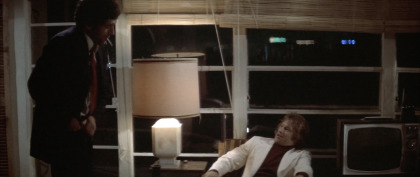

The film’s opening involves the great Philip Marlowe cajoling his hungry cat to eat first a concoction of cottage cheese and raw egg, then generic cat food. The two mewl, mumble and scratch in their understanding standoff. The film ends with Marlowe coolly justifying shooting his once-friend because Lennox indirectly killed the cat. Everything between is a meditation on loyalty.
As best exemplified in Nick and Nora Charles, noir understands relationships featuring fidelity and comfortable insults are the ones which really matter, so the snarky–sweet caring–codependent way Marlowe and hungry cat banter intentionally evokes true friendship. Altman called that opener important and Marlowe’s relation to his cat commentary on friendship: no matter how hectic his life, Marlowe is concerned the cat eats, whether the cops scare him, if he’s lost in LA’s mean streets.
Like most of his genre, Marlowe is destined to traverse the criminal underworld, continually learning the hard way he’s more loyal to friends, clients, even his constantly stoned neighbours, than they to him. He can’t bring himself to act on his cynicism until he’s burnt, and is a lost soul not because he’s dumb or drugged – he turns down even his neighbours’ hash brownie – but because he can’t find anywhere to put his trust.
Though they harass him and he blusters against their threats and handcuffs, Marlowe’s relationship with the cops is his most stable. He despises their work, they hate and stymie him, but at least he knows where he stands. Everywhere else is shifting sand and empty promises, golden and glittering by daylight, cold and dangerous at night. Under it all play morphing renditions of “The Long Goodbye,” refrains evolving and fading as quickly as relationships, adding atmosphere as Los Angeles underworld characters succour the detective and each other until betrayal becomes convenient.
As he searches for answers in mysteries and others, Marlow smokes to dull the pain – take a shot every time he strikes his match on a new surface, you’ll be drunk before the halfway point. Elliot Gould’s physicality superbly conveys Marlowe’s hurt and insecurity, shambling gait literalising existentially unsure footing.
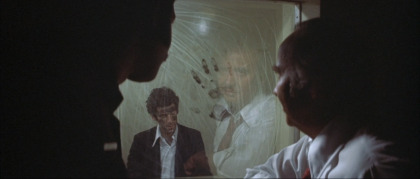
Altman’s shots and Zsigmond’s cinematography also expose Marlowe’s mental state. The beautiful police station tracking shot puts us in Marlowe’s gumshoes, showing his strain as he attempts to sort through the mountain of information, theories, and grief he’s been buried under. The long dolly across the grounds of the clinic has a similar effect, moving first methodically, then more frenetically as Marlowe’s frustration builds. Exposition of addresses and phone numbers unroll with slow camera movements over long takes, revelling in the acting’s stillness, taking a less usual route than montages to make the viewer feel Marlowe’s tedium and loneliness.
The odyssey is wrapped in perfectly exposed beach scenes, daytime sands yellow-tinged and California to their core, nighttime painted deep blacks and grainy red with Eileen’s dress the only spot of yellow. Doubled imagery and symbols of duplicity abound, the most striking of which involve the beach. First we see Marlowe in the glare off Wades’s window, projected between quarrelling lovers as they snipe at each other. Later, in the same window, Eileen is shown two-faced as she and Marlowe talk while her husband charges suicidally into the inky sea.

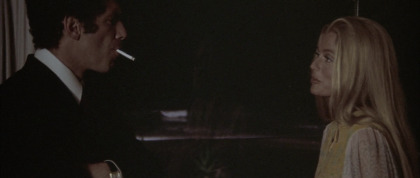
The whole film is a gorgeous depiction of our ugliest impulses, and Altman is the perfect director for it. Through various lenses and genres, Altman’s work examines intimacy and pain which can be leveraged by only those closest to us. Noir’s peripheral characters are who many of Altman’s other films center: desperate, impotent men; disloyal lovers; marriages on the verge; frustrated humans performing drastic acts. The Long Goodbye digs into side stories many noirs don’t unless impacting the protagonist directly: Farewell, My Lovely is more concerned with Marlowe’s relationship to the women in his path than the women themselves; American Gigolo hardly contains a conversation Julian Kaye isn’t in; Evelyn’s relationships in Chinatown mostly evolve when Jake is around to observe, and he’s around almost every frame. Some of The Long Goodbye’s more virulent events or breakdowns happen while Marlowe is out of the picture, or listening to nothing but crashing waves.
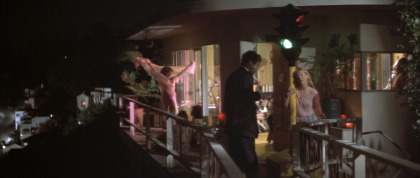
Altman is interested in examining these stories for their own sake, and shows it by examining side characters with the reflections motif, too. Zsigmond uses Eileen’s windshield brilliantly to reflect her facade as Marlowe chases her through the streets. The stoned hippy neighbours are introduced surrounded by floor-to-ceiling windows, one dancing with herself in the mirrored glass. The gate-guard-slash-impression-artist is reflected in Harry’s shiny car sidepanels, a symbol of security who pretends to be many other people, then shows himself more trustworthy than people pretending to be someone they’re not.
The guard also displays The Long Goodbye’s wicked sense of humour, along with the horny lookout whose ogling of stoned half-naked neighbour women allows Marlowe to sneak away. There’s the slapstick of Harry swinging haplessly on the gate trying clamber over as he imagines a detective should. Marlowe plants a sloppy handprint on the interrogation cell two-way mirror, then paints his face with fingerprint ink, cops impotent to stop his clowning. The guard dog fetching her owner’s stick from the waves has a twisted hilarity to it.
Which brings us, as the film continually does, back to loyalty. Relationships with animals are throughout: besides his cat, Marlowe nervously banters with the guard dog and talks as cheerfully as a damned man can to strays lying in the road. Ultimately animals’ loyalty – even only to the hand that feeds and then betrays them, pictured perfectly with mounted ducks – is still stronger than that of everyone else in his life, and loyalty is important to him.
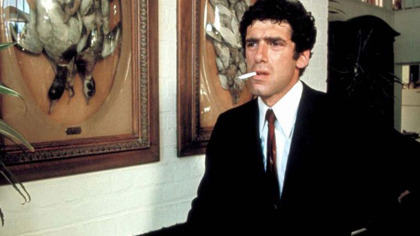
If only I’d recognised earlier how much my identifying with pulp heroes was due to my own sense of loyalty, deservedness of recipients be damned. “Their cynicism exactly stems from their compassion, [their] hardness is a scar tissue of a heart they can’t stop the world from breaking over and over.” I weirdly admired Marlowe hoping against hope, believing those he loves once, then again. You know what they say about fools.
Marlowe: Nobody cares but me.
Lennox: Well that’s you, Marlowe. You’ll never learn, you’re a born loser.
The Long Goodbye is Chandler’s most personal work. “You writers have your own special way of describing, don’t you?” is the movie acknowledging this sure as Chandler’s book commented on his deep insecurities, ideals, and philosophies. (The film references the book many times, including the face-bandaged man as a nod to Book Terry’s extensive plastic surgery.) Roger Ebert said in his original review, “The private eye as a fiction device was essentially a way to open doors; the best novels of Chandler and the others are simply hooks for a cynical morality.” Like Inherent Vice, the criminal underworld is alluring backdrop and murder the smaller mystery behind the real question of whether the detective can uphold his personal code in a world where ‘a man is only as good as his word’ simply means most men are no good. The real question, the crux and heart of the matter, is Will they keep clinging to that code? Why do we keep falling for those who throw us over?
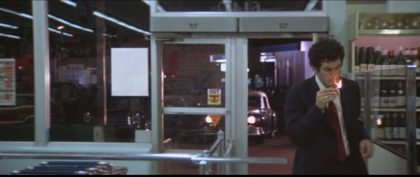
The thing about franchised noir detectives is, as characters or story properties, they can’t fundamentally change. They solve mysteries, their settings are updated from 50s to 70s to aughts to 2019, they jadedly swear they’ll never trust again, they may seem to learn their lesson. But in the end the stories reset. Sure as sunset and the next story, they get let down, used, double-crossed, stung, only to begin again when the next sultry shadow darkens their door. Once again they give their loyalties to a friend in need, a dame with legs up to there. Once again the dames and mates evaporate; or worse, explicitly sell our fallible hero upriver, relying on said hero’s tragically loyal personal code to prevent retaliation.
We’ve all had those dames and mates. We’ve all sworn to never love again, only to willingly set ourselves up for more heartbreak. People who mean what they say only so long as they feel like it. Family who love you so long as you’re meekly in line. Dames who say “I love you” in the night and “I’m leaving you” in the morning. Business partners who call you family until it’s more expedient not to be. Friends who say forever but mean for as long as you’re fun, and you’re no fun when you’re stumbling through a haze of pain or grief. Homme fatales who sell you out when a better offer comes in. Lovers who are loyal while you do exactly what they want.
In the first of two crucial scenes which start placidly before exploding into brutal violence, thug Marty gives a speech to/about his girlfriend Joanne. “Delicate and sweet . . . I love you. I do. . . . The single most important person in my life.” Ah, love, the highest form of loyalty.
Then he hits her across the face with a glass bottle.

Do we feel sorry for her? is the same question Tarantino asks in Once Upon A Time… In Hollywood when Brad Pitt’s Cliff smashes sadistic Sadie’s face with a can of dog food. The blow to Joanne’s face is lighter and unprovoked, but though her crimes are lighter, her madonna-like framing is window dressing. She blithely enjoys fruits of Marty’s torture, murder, and extortion, knowing her flippery is bought with blood money. (Her blow’s aftereffects are visually replicated by Jake’s bandages in Chinatown – directed by Polanski, who is depicted in Once Upon A Time, making these films a Möbius strip of themes, imagery, period, and settings.)
In different ways, Joanne and Sadie establish The Long Goodbye and Once Upon a Time‘s cruel worlds, where psychopaths and rich ruthless men get their way. Both center men with drinking and smoking habits, a dubious past, and a personal moral code. Marlowe and Cliff fight against the establishment, for themselves and their friends. Though they don’t believe in innocence, they want to believe people exist whose souls at least aren’t as dark as the rest of ours. Within their morality is loyalty; Cliff to Rick Dalton, Marlowe to Terry or at least the idea of him: “Terry Lenox was my friend you motherfucker . . . you don’t deserve to be alive you fuckin’ pig.” Rick and Terry don’t return the loyalty, yet Cliff and Marlowe can’t help themselves. It’s their code.
The Long Goodbye ending Ebert calls “off the wall” I see as wish fulfilment, same as Once’s. In the film Terry gets justice delivered by Marlowe, Bracket’s screenplay ‘fixing’ the book’s injustice. Altman revels in this playground where disloyalty equals death and real world consequences are momentarily suspended for a warped fairy tale ending.
The final shot is reminiscent of Holly Martins waiting on a tree-lined boulevard in The Third Man, another film featuring a man unendingly loyal to a death-faking friend who didn’t deserve such fidelity. The Long Goodbye’s last shot brings yellow in again, reminding us of Eileen’s dress, the faded sun on the beach, letters and pledges of friendship aged and brittled by time. Only here, Marlowe’s the one walking away, getting as happy an ending as one can hope for in noir.
This slideshow requires JavaScript.
Lennox blindsided Marlowe, then called him a fool for expecting others to do what he would in keeping his word. Pulp detectives are thrown under the bus or off a cliff with the shrugged excuse along the lines of “I knew you were tough enough to survive” or “sorry, you were just collateral damage.” Given enough time, “I threw you under the bus to save myself” becomes “It was the best option for both of us” becomes “you survived and are better for learning this lesson, you should be thanking me!” This essay draws parallels to Marlowe and Veronica Mars’ getting run over because of their clinging to loyalty, “an anchor that binds.”
But every detective also has their breaking point, the point at which they say the rules have been violated enough to justify them taking matters into their own hands.
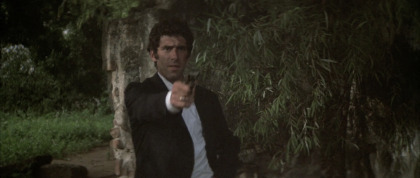
Marlowe: I have two friends in the world. One is a cat. The other is a murderer.
Is loyalty its own reward? Chandler’s book seems to argue it is, but Marlowe shooting his once-friend in the film argues something else. Grown and free of the romanticised prism Younger Me viewed Marlowe through, do I believe Chandler’s ending or Brackett’s?
The teenager who first read Chandler’s book would choose idealism: be true to your code, give your loyalty, those who turn on you will get what they deserve while you can keep the moral high ground. Even with grim answers in front of me, maybe I’d make like Marlowe, clinging stubbornly to loyalty disavowed by its recipient, or keeping myself preoccupied searching for answers and other mysteries.
While I want to hold to those ideals still, what are movies for if not to show us what we really want, wish-fulfilling our basest instincts? Watching now, I can’t help but savour that moment Marlowe tosses his cigarette, reaches into his waistband, and coolly shoots the man who treated his loyalty as commodity.
For #Noirvember, I wrote about the concept of loyalty in noir in general, and "The Long Goodbye" in particular. My upbringing was starkly black and white, everything strictly categorised as sin and acceptable, allowed and not.
0 notes
Text
Glen Coco’s Top 10 Films of 2016

Another year has passed and although it wasn’t the greatest year for film, there were still several that stood out. Here are my picks for the top 10 films of 2016. But first, the runners up:
Runners Up
-10 Cloverfield Lane
-Fences
-Hell or High Water
-Loving
-Nocturnal Animals
-Sing Street
-Sully
And here’s the top 10!
#10b (Bonus Track): The Witch
Director: Robert Eggers
Starring: Anya Taylor-Joy, Ralph Ineson, Kate Dickie
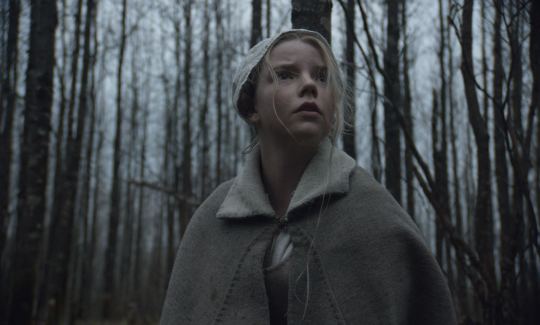
The fact that a horror movie is anywhere near my top 10 list is astounding, but The Witch is a rare gem in a genre usually composed of cliches and cheap thrills. This is one of the most beautifully photographed movies of the year containing countless striking shots and director Robert Eggers creates a mood of almost unbearable tension. The film follows a family who’s been banished by their community to live in a remote part of the woods where strange things begin to happen and we’re never quite sure whether it’s mere paranoia or something supernatural. What’s so impressive is that we see very few little violence or traditionally scary images, yet Eggers always makes you feel like such elements are just around the corner. It’s been said before, but it’s what you don’t see that’s terrifying. The reason why this film isn’t in the top 10 is because of audio problems and poor line delivery. The story is already ambivalent, but you’ll find yourself even more lost because you miss half the dialogue. That said, it’s still a pleasure to look at and definitely worth an honourable mention.
#10: Silence
Director: Martin Scorsese
Starring: Andrew Garfield, Adam Driver, Liam Neeson

No, it’s not Martin Scorsese’s best film, but even his lesser works are better than most movies out there. Silence is officially a box office flop and admittedly its pacing is frustrating at times, but its effect is undeniable and will leave you thinking about it well after the credits roll. The movie follows two Jesuit priests (Andrew Garfield and Adam Driver) as they search for their mentor (Liam Neeson) who’s apparently given up the faith in a 17th Japan that was ruthless toward Catholics. Though the sceenplay could’ve been a bit tighter, like The Witch the movie looks marvelous thanks to Scorsese and cinematographer Rodrigo Prieto. Scenes of the priests sneaking through caves, Catholics crucified over the ocean or chilling events seen through the bars of a prison cell are all visually stunning if not disturbing. And the dilemma of whether it’s moral to allow others to die just to uphold one’s faith is an important question here and one that’s handled with care.
#9: Moonlight
Director: Barry Jenkins
Starring: Trevante Rhodes, Ashton Sanders, Alex Hibbert, Mahershala Ali, Naomie Harris, Andre Holland
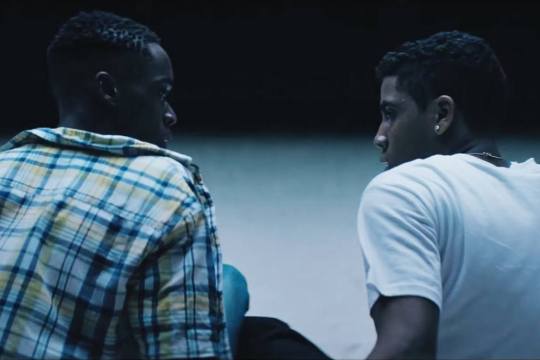
Moonlight tells the harrowing story of Chiron, a gay African American growing up in the projects of Miami. Unfortunately, in a place like this where machismo reigns supreme, Chiron seemingly has no chance; it’s a tragic situation. Impeccably acted by all three performers who play Chiron as well as the supporting cast, especially Naomie Harris as his drug-addicted mother, the story is told in three different time periods, enhancing the idea these problems can’t be solved overnight and that people from these neighborhoods do, in fact, grow, mature and have fascinating, complicated lives. Directed with poetry and grace, covering both the tenderness and darkness of this character’s life, Barry Jenkins brings everything together perfectly with a final, almost real time, sequence completely devoid of action, but rich in honesty, vulnerability and feeling with Trevante Rhodes and Andre Holland holding your unwavering attention. We’re entranced by the implications of their meeting and eagerly await the outcome.
#8: The Edge of Seventeen
Director: Kelly Fremon Craig
Starring: Hailee Steinfeld, Haley Lu Richardson, Blake Jenner, Woody Harrelson

Although the problems Nadine (Hailee Steinfeld) faces in The Edge of Seventeen pale in comparison to those of other characters in this list, they’re still realistic, identifiable and fitting for a 17-year-old high school student. Nadine’s already awkward, lonely and isolated from her classmates and she has to deal with her only friend dating her older, more popular brother. It sounds like a recipe for a paint-by-numbers teen comedy, but writer/director Kelly Fremon Craig provides one of the most honest and witty screenplays of the year. Steinfeld is quite possibly the best 20-and-under actor in Hollywood today and was completely snubbed for this complex role as a precocious young lady who’s too smart and witty for her own good. She’s hilarious in this role, but also naive and vulnerable and it’s these qualities under the surface that make her such a sympathetic character. Woody Harrelson is exceptional playing the hard-edged mentor teacher who cares about her deep down despite his tough love. The verbal sparring between the two is a delight to witness in an equally delightful film.
#7: Popstar: Never Stop Never Stopping
Director: Akiva Schaffer, Jorma Taccone
Starring: Ander Samberg, Akiva Schaffer, Jorma Taccone

Considering the rest of this list, no, this isn’t a joke. Popstar: Never Stop Never Stopping is the funniest movie of 2016 and one of the funniest movies in recent memory. Written and directed by Akiva Schaffer and Jorma Taccone, 2/3 of the Lonely Island comedy group, they’re joined by their partner Andy Samberg in acting and writing efforts to bring us this hilarious mockumentary and biting satire about the pop music industry. Producing countless belly laughs through priceless one-liners and some of the funniest sight gags you’ll see, Popstar focuses on the rise and fall and rise of The Style Boyz and all the infighting that comes with that. And I can’t forget to mention the outrageously funny original songs. Any movie whose song contains the lyrics “I wanna fuck you like we fucked up Bin Laden” has to be good.
#6: Manchester by the Sea
Director: Kenneth Lonergan
Starring: Casey Affleck, Lucas Hedges, Michelle Williams
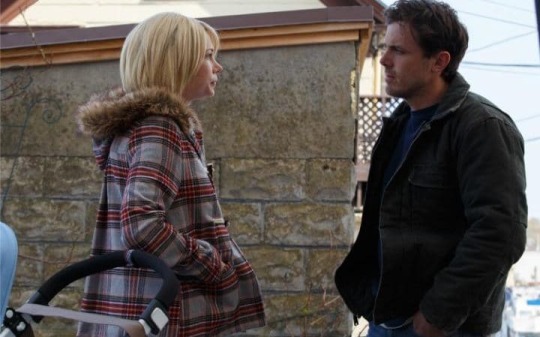
Manchester by the Sea is a minor miracle. Here’s a film whose protagonist has ruined his life through a horrifyingly plausible accident, abandoned his titular coastal hometown due to overwhelming grief and guilt and now must return to take care of his nephew following his brother’s death, yet somehow writer/director Kenneth Lonergan manages to avoid melodrama and manipulation. This is a film with emotional complexity and gorgeous naturalism in a story with no easy answers or moments of eye-opening catharsis. The whole cast is extraordinary, but Casey Affleck stands out playing Lee Chandler who displays flat, distant behavior on the outside, while simultaneously conveying the emotional turmoil going on within, trying to deal with one tragedy after another. It’s an impressively restrained performance for a character who we come to sympathize with more and more as the plot unfolds. The ending won’t please everyone, but it’s honest, human and entirely realistic just like the film.
#5: 20th Century Women
Director: Mike Mills
Starring: Annette Bening, Greta Gerwig, Elle Fanning, Billy Crudup

20th Century Women takes place in the late ‘70s when the cultural identity of America was in a state of flux. This feeling permeates the film and even though it concerns a small group of seemingly insignificant characters, the film is framed within a much larger history and this coupled with the revelation of the characters’ fates far down the road gives the proceedings a heightened sense of importance. Annette Bening, another Oscar snub, is perfect in this role as an aging mother trying to navigate such a strange world while attempting to reconcile her conservative tendencies and wariness of modern life with her liberal values and open-mindedness. This complicated, 3-dimensional character recruits some lodgers and neighbours to help raise her boy, but these people are just as complicated, flawed and, indeed, beautiful themselves, especially Abbie played by the magnetic Greta Gerwig. The movie has little plot, but you fall in love with the characters and their struggles and that’s really what’s important.
#4: La La Land
Director: Damien Chazelle
Starring: Ryan Gosling, Emma Stone

The people involved in making La La Land should just be thankful the film was produced. A completely original movie musical filled with jazz doesn’t sound like the most lucrative products for today’s audiences. But with the help of Damien Chazelle, who demonstrated his wizardry behind the camera and helped bring jazz to the forefront with his extraordinary Whiplash, and two of the biggest stars in Hollywood today, Emma Stone and Ryan Gosling, the movie has become a technical marvel and a smash hit. Bringing to mind the classic old Hollywood musicals, La La Land tells the story of two struggling artists with Gosling and Stone making us invested in these struggles every literal and figurative step of the way. Containing breathtaking dance numbers, infectious original songs and some truly show-stopping moments, the movie is fun and exhilarating from start to finish and the chemistry between Gosling and Stone is possibly the best you’ll see in 2016. It’s impossible to walk out of this movie without a smile on your face.
#3: Arrival
Director: Denis Villeneuve
Starring: Amy Adams, Jeremy Renner, Forest Whitaker
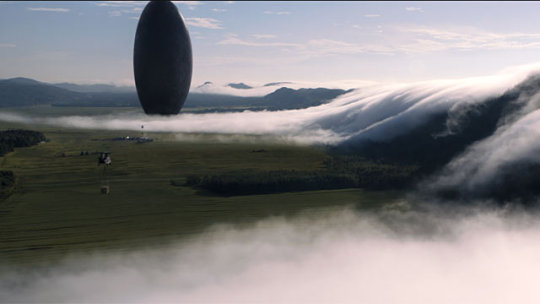
Arrival is a realistic and logical take on the fascinating premise of first contact. Denis Villeneuve, one of the best directors in the business, is an expert at creating and maintaining an almost suffocating level of suspense with the help of his distinct camera work, steady pacing and nerve-wracking music. The snubbed Amy Adams is brilliant as Louise, mourning the loss of her daughter while facing the herculean challenge of communicating with aliens. Adams has a way of making Louise quiet, contemplative, even sad without exuding weakness. Unlike lesser films where a communication problem like this is solved in minutes, Arrival presents it as a grueling process involving linguistics and translation that Louise and Ian Donnelly (Jeremy Renner) must go through in order to make even the smallest breakthrough. This aspect of the film is entirely convincing and even educational. The ending is a real mind bender that’s executed elegantly and adds another thought-provoking layer to an already dense narrative. The best moment, though, is a scene where a helicopter’s approaching a spacecraft hovering in the distance. The view of the object in the background coupled with the unnerving music and lack of dialogue is hypnotizing and brings to mind imagery from 2001: A Space Odyssey. It’s a truly mesmerizing sequence.
#2: Lion
Director: Garth Davis
Starring: Dev Patel, Sunny Pawar, Nicole Kidman, Rooney Mara

The most important thing about a story is that you’re invested in the characters and no other movie of 2016 makes you as invested in its lead as Lion. The thought of falling asleep on a random train and waking up hundreds of kilometers away from your home is terrifying, especially if you’re a young child in a densely populated country like India who doesn’t know where home is. But that’s the true story of Saroo, ably played by the young Sunny Pawar and the older Dev Patel. Remarkably, the adult Saroo manages to use Google Earth to find his home and long lost family. All aspects of the film work from the directing to the writing to the wonderful performances. It’s a pleasure going on this extraordinary journey with Saroo. It all culminates in the most satisfying ending of a film in 2016 that challenges you to keep a your eyes dry. You won’t be able to. This is the most inspirational film of the year.
#1: Everybody Wants Some!!
Director: Richard Linklater
Starring: Blake Jenner, Zoey Deutch, Glen Powell, Tyler Hoechlin

It wasn’t nominated for anything, it’s not groundbreaking and no one even saw it, but, dammit, Everybody Wants Some!! is the most satisfying movie experience of 2016. No, it’s not as good as Dazed and Confused, its spiritual prequel, but it’s pretty damn close. The film follows a group of university baseball players in the days leading up to the first day of school. That’s it. Writer/director Richard Linklater understands youth, knows how people talk and has a firm grasp of time and place and he combines all three of these qualities perfectly here. There’s no real plot to speak of but Linklater is that rare filmmaker whose dialogue is so engrossing and whose characters are so relatable that we can forgive him and just enjoy the ride. He also captures that unique time period of the late ‘70s and early ‘80s, just like 20th Century Women, where cultural identity was so undefined. He showcases this with a great, eclectic soundtrack composed of rock, pop, rap, new wave and country tunes and even the players go from a disco to a country bar to a punk rock show all in one weekend. But what makes this movie work is the baseball players themselves. Sure, their goals are similar to most college-aged men: have sex, drink beer and compete with each other over everything. But there’s so much more to these characters who sound and act like real humans with varying traits, opinions and emotions. Their macho exteriors don’t drown out their insecurities and insight into their own lives and surroundings. Most importantly, though, you’ll have a blast watching this movie. There’s not a dull scene or exchange within and it’s often laugh-out-loud funny. Hell, it’s literally and figuratively one big party and it’ll make you want to jump through the screen and join in.
0 notes